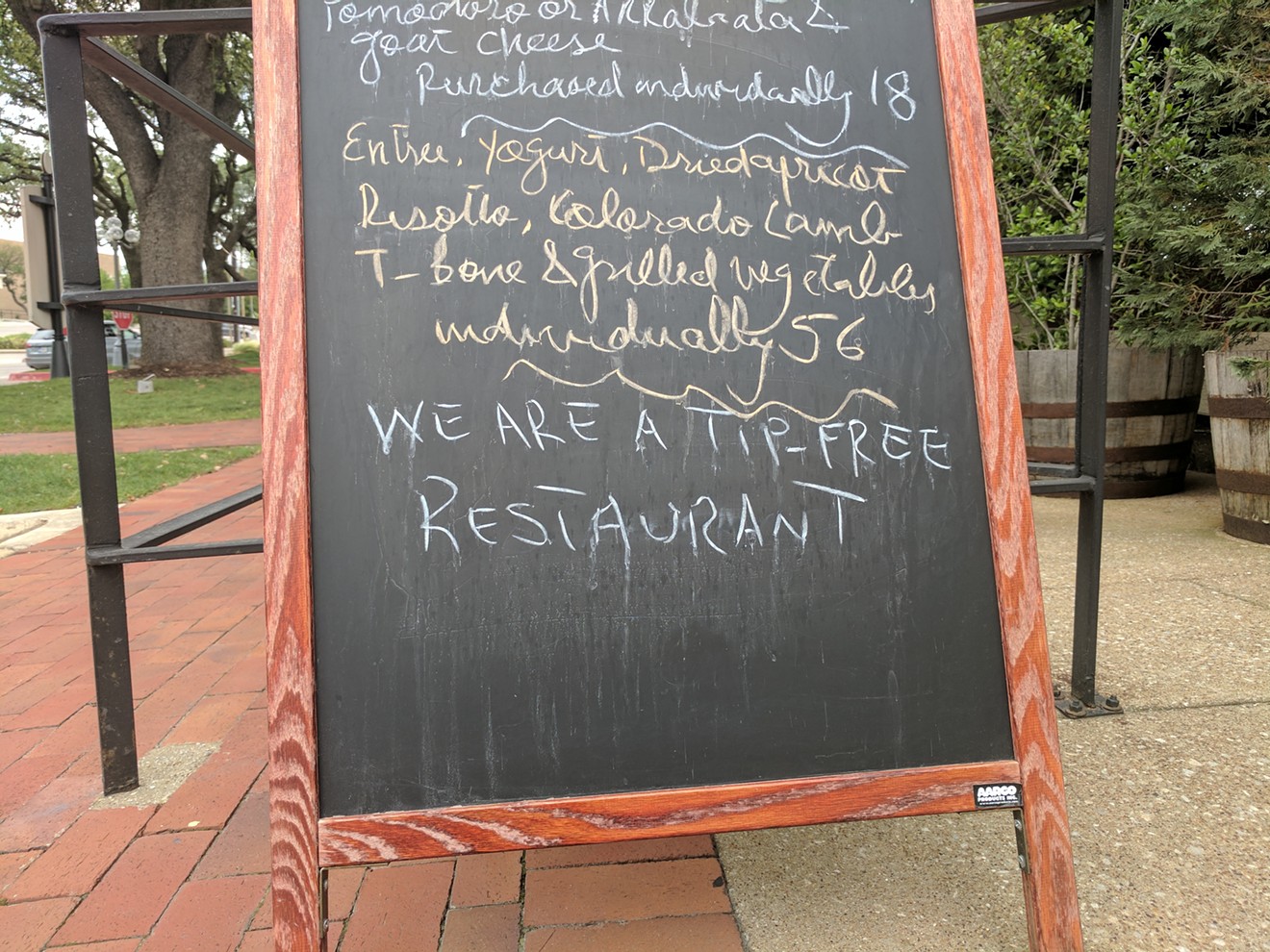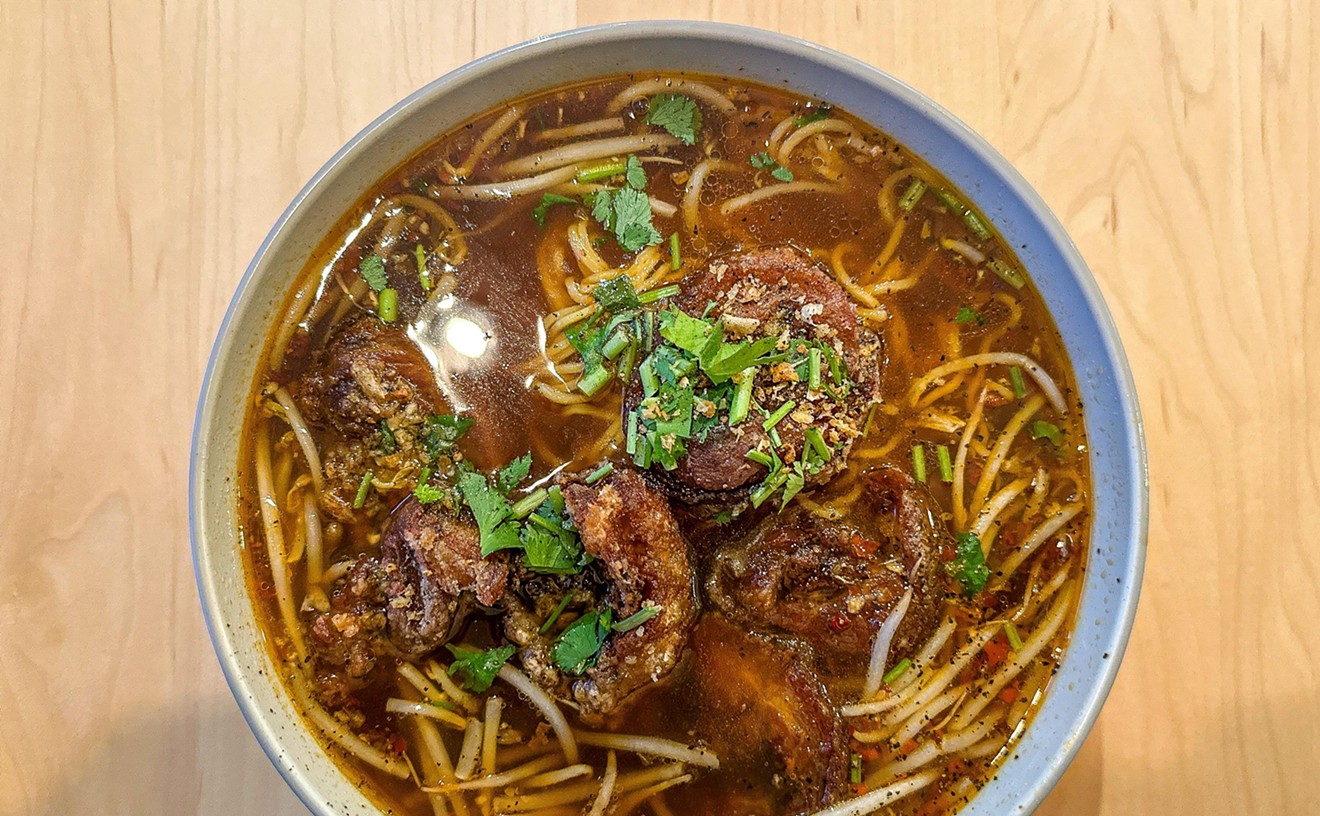“It is uncharted territory for me, of course," Gorji told the Observer at the time. "I am very anxious to see how it turns out. But at some point, you have to conquer your fears and find out.”
Five months on, the Canary owner says he's learned that a restaurant without tips can do just fine in Dallas.
"It's going wonderfully," Gorji says. "We gained a lot of people [customers], we lost a few. It has been received, from what I see, pretty well."
Gorji sees improvements to his restaurant's service. "There is no competition [among waiters]. There is no, oh, this is my table, that is your table," he says. Moreover, the change has allowed his waiters to specialize and divide their labor according to expertise; one waiter with deep knowledge of wine has taken on sommelier duties.
In some ways, Canary is the perfect restaurant for the no-tipping experiment. It has just seven or eight tables, depending on the night's bookings, and only about 30 total seats. By Gorji's estimate, about 40 percent of his customers are regulars. And Canary has experience with banning things: Before cutting tips, the restaurant had already banned televisions and children, opted against using the restaurant's front counter for bar seating and restricted the night's service to one seating per table.
The restaurant has just two waiters, and they've taken to the new policy well. One, a local graduate student, started working for the restaurant just before it accepted its last tip and uses the flexibility to accommodate his studies. The other waiter, James Kappele, has worked at Canary for two years now.
"I've been doing this since 1976," Kappele says. Among the restaurants he's worked for: Cafe Pacific, Dakota's, the original Mi Piaci, Sevy's, Del Frisco's. "When I started doing this, waiter was a profession. Now it's more of a temporary thing." He sees a living-wage system as a way to help revive the older ways.
"Being a small restaurant," Kappele says, "there's times – Wednesday we had one tab, four people. But I still make money. I don't have to push people. I hate doing that. I've had to do that other places, and I hate doing it. I don't have to push any wine. We have Opus One; if they want, I can open Opus One, but we don't have to push that on anyone."
Admittedly, some customers are confused or even put off by the change. Canary staff have had to return money left on tables.
"Chef purposely left the tip value [on receipts] so he could zero it out, so people could see what we're doing," Kappele says. "People see it, and they look up, they look down, they look up, they look down. They say, there's no tip! I say, 'Chef pays us a living wage, so we're OK.'"
The no-tipping system may yield less money on nights when there would be a windfall of gratuities, but it also keeps things stable during slow seasons, Gorji and Kappele say.
"We're coming up on summer. Summer is traditionally slow in restaurants; people come in and get drinks and appetizers," Kappele says. "You're not getting tips. This system is an assurance.""The [tipping] system promotes up-sell. It is not the fault of the waiters – it is the system of the more you sell, the more you make"
tweet this
Gorji declined to say exactly what he's currently paying his staff both in the kitchen and front-of-house, but "we start way above minimum wage and increase incrementally depending upon experience, ability, willingness to learn and longevity," he says. "Everyone consistently makes comparable or better wages than their respective positions' average in the hospitality industry here in Dallas."
Gorji's advice for restaurant owners considering the no-tip model: First, "you have to believe in what you're doing," he says, noting that restaurateurs have to be confident their business can survive without up-selling or gimmickry. And, he says, "Make sure your team is on board. Know your staff." Know how they feel about the new policy and if their personalities will be well-suited.
The team at Canary hopes they can set an example for other restaurants in Dallas, but Canary isn't a typical Dallas restaurant – with only two waiters, their team is far smaller than most establishments. Even so, in talking to Gorji and Kappele, one gets the sense that the decision to discontinue tipping is a moral and even ideological one about what makes a good waiter and what makes a good restaurant.
"The [tipping] system promotes up-sell," Gorji says. "It is not the fault of the waiters – it is the system of the more you sell, the more you make. It is a commission. Tipping is a commission."













